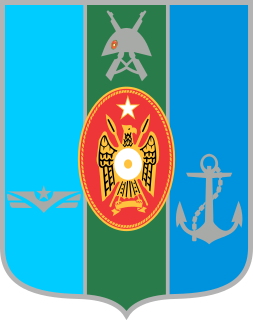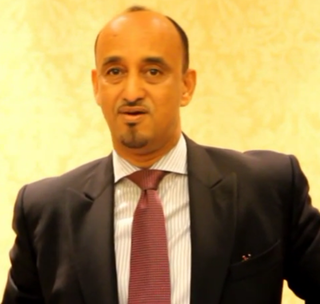
The politics of Somalia takes place in a framework of federal parliamentary representative democratic republic. According to the Constitution of Somalia, the President of Somalia is head of state, and Prime Minister as head of government who is appointed by the President with the parliament's approval.

The Somali Armed Forces are the military forces of the Federal Republic of Somalia. Headed by the President as Commander in Chief, they are constitutionally mandated to ensure the nation's sovereignty, independence and territorial integrity.

The Somali Civil War is an ongoing civil war which is taking place in Somalia. It grew out of resistance to the military junta which was led by Siad Barre during the 1980s. From 1988 to 1990, the Somali Armed Forces began engaging in combat against various armed rebel groups, including the Somali Salvation Democratic Front in the northeast, the Somali National Movement in the northwest, and the United Somali Congress in the south. The clan-based armed opposition groups overthrew the Barre government in 1991.
An arms embargo is a restriction or a set of sanctions that applies either solely to weaponry or also to "dual-use technology." An arms embargo may serve one or more purposes:

The African Union Mission in Somalia (AMISOM) is an active, regional peacekeeping mission operated by the African Union with the approval of the United Nations Security Council. It is mandated to support transitional governmental structures, implement a national security plan, train the Somali security forces, and to assist in creating a secure environment for the delivery of humanitarian aid. As part of its duties, AMISOM also supports the Federal Government of Somalia's forces in their battle against Al-Shabaab militants.
Various international and local diplomatic and humanitarian efforts in the Somali Civil War have been in effect since the conflict first began in the early 1990s. The latter include diplomatic initiatives put together by the African Union, the Arab League and the European Union, as well as humanitarian efforts led by the Office for the Coordination of Humanitarian Affairs (OCHA), UNICEF, the World Food Programme (WFP), the Puntland Maritime Police Force (PMPF) and the Somali Red Crescent Society (SRCS).

Somalia–United States relations are bilateral relations between the Federal Republic of Somalia and the United States of America. Somalia has an embassy in Washington, D.C., and the United States maintains an embassy in Mogadishu which was reopened in late 2019.

The 2009–present phase of the Somali Civil War is concentrated in southern and central Somalia and portions of north eastern Kenya. It began in early February 2009 with the conflict between the forces of the Federal Government of Somalia, assisted by African Union peacekeeping troops, and various militant groups and factions. The violence has displaced thousands of people in the southern part of the country. The civil war has also seen fighting between the Sufi Ahlu Sunna Waljama'a and al-Shabaab.

United Nations Security Council Resolution 1863, adopted unanimously on January 16, 2009, after recalling resolutions 733 (1992), 751 (1992), 1356 (2001), 1425 (2002), 1519 (2003), 1725 (2006), 1744 (2007), 1772 (2007), 1801 (2008), 1811 (2008), 1814 (2008), 1831 (2008) and 1844 (2008) on the situation in Somalia, the Council its intention to establish a peace-keeping force in war-torn Somalia and called on Secretary-General Ban Ki-moon to develop, by April 15, 2009, a mandate for the proposed mission, which would replace the existing African Union force in the country (AMISOM).

United Nations Security Council Resolution 1916, adopted unanimously on March 19, 2010, after recalling resolutions 733 (1992), 1519 (2003), 1558 (2004), 1587 (2004), 1630 (2005), 1676 (2006), 1724 (2006), 1744 (2007), 1766 (2007), 1772 (2007), 1801 (2008), 1811 (2008), 1844 (2008), 1853 (2008), 1862 (2009), 1894 (2009) and 1907 (2009), the Council extended the term of the Monitoring Group for 12 months and expanded its mandate to include the monitoring of the arms embargo on Eritrea in addition to Somalia.

Abdihakim Mohamoud Haji-Faqi, also spelled Abdulhakim Mahamud Fiqi, is a Somali diplomat and politician. He twice served as the Minister of Defence of Somalia.

United Nations Security Council Resolution 1724, adopted unanimously on November 29, 2006, after recalling previous resolutions on the situation in Somalia, particularly resolutions 733 (1992), 1519 (2003), 1558 (2004), 1587 (2005), 1630 (2006) and 1676 (2006), the Council re-established a group to monitor the arms embargo against the country for a further six months and condemned an increase in the flow of weapons to the country.
United Nations Security Council Resolution 1725, adopted unanimously on December 6, 2006, after recalling previous resolutions on the situation in Somalia, particularly resolutions 733 (1992), 1356 (2001) and 1425 (2002), the Council authorised the Intergovernmental Authority on Development (IGAD) and African Union to establish a protection and training mission in the country.

United Nations Security Council Resolution 2002, adopted unanimously on July 29, 2011, after recalling resolutions 733 (1992), 1519 (2003), 1558 (2004), 1587 (2004), 1630 (2005), 1676 (2006), 1724 (2006), 1744 (2007), 1766 (2007), 1772 (2007), 1801 (2008), 1811 (2008), 1844 (2008), 1853 (2008), 1862 (2009), 1907 (2009), 1916 (2010) and 1972 (2011), the Council tightened sanctions against Eritrea and Somalia to include individuals and entities recruiting or using child soldiers in the Somali Civil War, in addition to those responsible for attacks against schools and hospitals in Somalia.
United Nations Security Council Resolution 1744, adopted unanimously on 20 February 2007, authorizing the African Union mission replacing and subsuming the IGAD Peace Support Mission in Somalia or IGASOM, which was a proposed Intergovernmental Authority on Development protection and training mission to Somalia approved by the African Union on 14 September 2006. IGASOM was also approved by the United Nations Security Council on 6 December 2006.
United Nations Security Council Resolution 1814 was unanimously adopted on 15 May 2008. The resolution called for the United Nations to provide economic, political and technical support to Somalia, with a possible UN peacekeeping force.
United Nations Security Council Resolution 1811 was unanimously adopted on 29 April 2008.

Hassan Sheikh Mohamud is a Somali politician. He is the founder and current chairman of a large political aggregation party which have majority of parliament in both chambers Union for Peace and Development Party, He was the 8th President of Somalia from 16 September 2012 until 16 February 2017. A civil and political activist, Mohamud was previously a university professor and dean. In April 2013, Mohamud was named to the Time 100, TIME magazine's annual list of the 100 most influential people in the world. His efforts at advancing national reconciliation, anti-corruption measures, and socio-economic and security sector reforms in Somalia were cited as reasons for the selection. He was born in Jalalaqsi, a small agricultural town situated in central Hiran of present-day Somalia, during the trusteeship period. and comes from a middle-class background. Hassan is married to Qamar Ali Omar and has children. He speaks Somali and English.

Himan and Heeb was an autonomous region in the Federal Republic of Somalia. Formed in 2008, its capital was the central town of Adado (Cadaado). In 2015 Himan and Heeb merged with Galmudug to form a much larger Galmudug which consists of Mudug and Galguduud regions.











